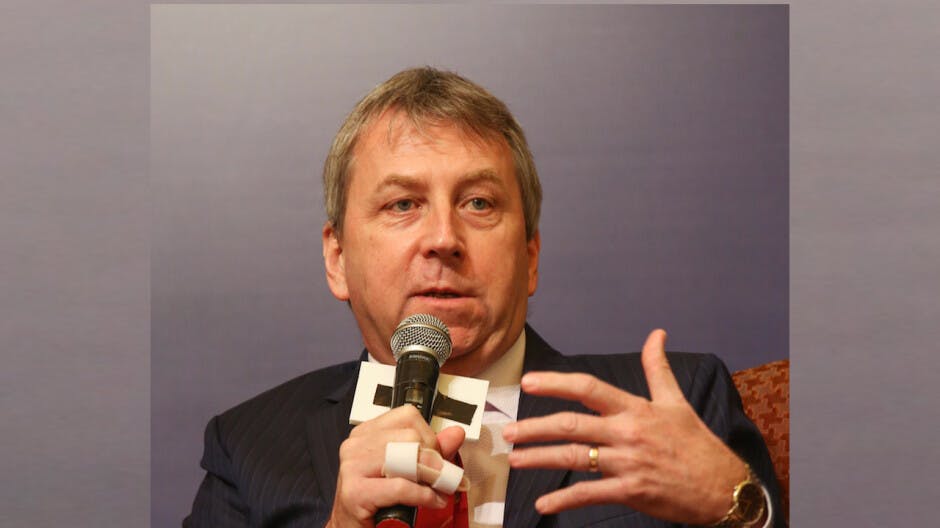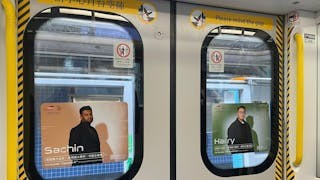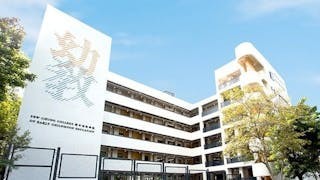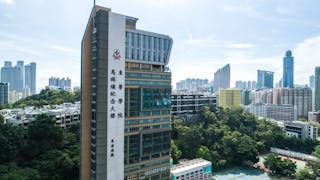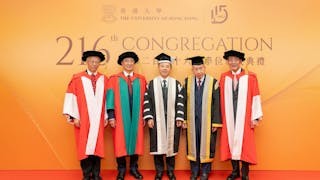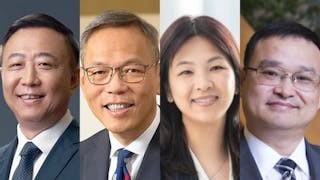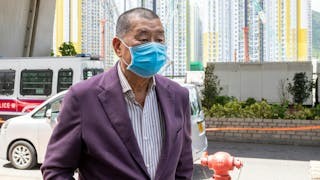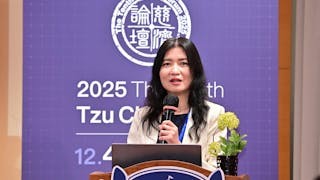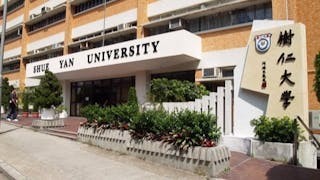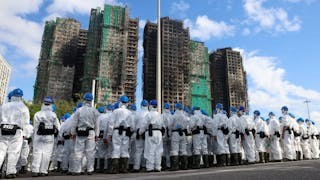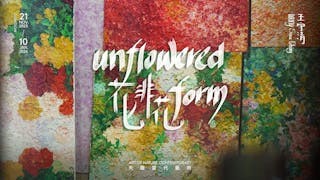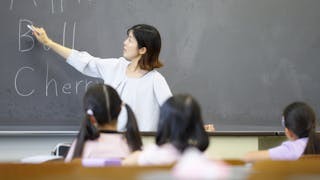編按:香港大學第15任校長馬斐森(Peter Mathieson)於月初(2月2日)宣布辭職,將於明年(2018)1月或之前離任,其後將赴英國愛丁堡大學出任校長。馬斐森新官上任之際,隨即迎來「佔中」和校委會風波兩大棘手難題,其中後者更衍生各種衝突,最後不歡而散。外界不少猜測,馬斐森請辭多少受到一定的政治壓力,他本人辭職時曾發言否認相關言論。由公民實踐培育基金舉辦的公民實踐論壇——「香港管治:禮樂崩壞?」是馬斐森在宣布辭職前最後一次公開演講,內容談到他對學術自由和院校自主的堅持,以及對任內大事回顧。以下為演講內容:
我想從我對「學術自由」和「院校自主」的定義來展開今天的演講。這兩個術語時常被誤用來描述近年香港發生的事件。 人們有時候會將這個兩個術語互換使用,但在我看來,他們的意思不盡相同,應小心運用。 我的工作,跟我的同行一樣,在於闡明和表達我們這些概念到底意味着什麼,以及為何重要。
學術自由對於一所享負國際信譽的大學是絕對必要的。 我堅信,本地大學擁有國際信譽,對香港而言是一件好事。 學術自由包括書寫、閱讀、研究或教授任何讓你感興趣的領域,不論議題有多具爭議。我相信學術自由活現於我的大學和香港其他大學, 但當中肯定存在挑戰,正如我稍後會提到,這些挑戰不是香港獨有的。
昔日未曾逃脫政治干預
我擔心的另一個方面是所謂的「自我審查」,特別是在初級職員之間,沒有人真正告訴他們什麼該做與否, 但怕動輒得咎,他們對有爭議的領域會保持警覺。我將此視為一項重要的責任,與高層同事、各院系之長和小組領導等,一直保障初級員工作的學術自由,讓他們不必進行自我審查。
院校自主另當別論。 這是關於政策、財務、人員配備、優先戰略等的決策是否有足夠的自主權。 在政府資助機構中,我接受不能做到完全自主,但我們對公眾有責任,對代表他們的政府亦然。 花費公帑,理應為其分配和運用負責;但這不是表示隨時歡迎自治侵權的介入。我們知道如何管理事務,也樂意讓我們放手去幹。 我也想區分一下「建議」和「干擾」:建議無任歡迎,但謝絕干擾。
在這裏,我想以我今昔生活打個比方。我在英國的大學部門和國民保健署(NHS)工作了30年,兩者都被視為政府資助機構(雖然英國學費的增長導致直接政府對院校的資助減少)。在 NHS 和大學得自主性有限,可說是每週每天都受到政治干預。英國的大學看到了推行和增加學費徵收的空間,以及政府對本科教育的直接資助相應減少。英國的大學已嘗試成為社會工程的一環,然而外圍事件如2008年的經濟衰退和最近的「脫歐」等,對大學部門都有重大影響。
至於國民保健署,我在英國任職醫生的這些年,所見的實況是部門間充斥着永無休止的的改革事項:組織結構變更、籌資機制調整,甚至藥物處方限制、提供服務的優先次序(如體外受精等)。誰說這不是「政治干預」?各種政治家及其不同政黨的動機尚有爭論的餘地,但在 NHS 工作的歲月卻從沒有脫離政治的干預,無容置疑。
因此我來到香港接任現在的工作。 我樂意在公共機關工作,成為人民公僕,為公眾利益將公帑運用得宜。我樂見香港政府資助的大學所承擔的社會道德責任。有時媒體關注是無法抵抗的,但我更喜歡有他們的關注,至少這意味着人們關心香港大學,甚至連大學裏最平凡的活動,也置於報章頭條。在奧運會如火如荼全面展開之際,世界各地爆發恐怖襲擊之時,政治動盪和各種戰爭持續不斷之下,《南華早報》依然認為,香港大學裏一些次要人員配置改革的故事最值得他們放在頭版這樣的領導地位之上,這種錯置的指控反映了對學術自由的攻擊。歡迎來到我的世界。
籲港大師生 以安全為先
我想具體說一下在我首年工作任期發生的兩項極具爭議的事件。 第一個是佔領中環,第二個是香港大學副校長任命風波。
關於佔領中環,我最主要的關切是我願意竭盡所能來實現和平的結局。 我覺得我對我的學生和職員有着如同家長的責任。據統計只有20%的參與者是大學生,因此把「佔領中環」稱為「學生運動」是不準確的,但我們都認同這是一場年輕人的抗爭,因為大多數參與者在30歲以下, 而他們所為將永遠改變香港。
2014年10月2日是我接任工作的第185天。我記得特別清楚,當晚香港中文大學(中大)校長沈祖堯和我去了金鐘現場。我們決定去現場不是經過深思熟慮的策略或傾向某種政黨的取態,而是單純為了關心(學生的)安全,是本能反應,或說是情之所至。
當天,我們各自接到學生領袖的電話,並關心事態發展。我問致電給我的學生領袖:「如果我到現場會否有些幫助?」她說:「會的,我認為有幫助。」所以我叫上沈祖堯同行。沈祖堯和我相識達12年之久,因為我曾任中大的訪問考官,當時沈祖堯是醫學院教授。我們提前說好,如果我們去抗爭現場,會一起前往。因此我打電話給他,說:「我要去現場看看。」他說:「好吧,什麼時候?」然後我說:「現在。」我可以感覺到他看着他的手錶,那時候大約是晚上10:30,然後他說:「好了,現場見。」就這樣我們約好了見面。
然後我告訴我的妻子:「我要去現場看看。」她說:「為什麼?」我說:「我不知道,我只是覺得我應該這麼做。」她接着說:「那你準備要說什麼?」我說:「我不知道。我會在車上想一些說辭。」這情之所至的本能反應。這可能會有危險,但我們最大的動力還是希望確保學生的安全。
如果我在算是抗爭後期的當晚,所作出的貢獻有助於避免暴力和流血的話,我十分滿意。 我不得不在剩餘的非政黨人士、保護大學成員的言論自由和尊重法律之間劃一條非常困難的界線,以確保人們的安全。我認為在這段時期,香港大學能夠堅守這個原則。
支持任命不果 延遲決定使事態發酵
我想介紹的第二個問題是香港大學學術和人力資源副校長的任命風波。 在我接任工作之前,數位校委會成員和建制成員都向我推薦了一位特定的人物。他作為新星,也是非常適合成為我的新高級管理團隊的一份子的人選。 我隨後主持了學術和資源副校長職位遴選校委會,最終達成一致意見,但後來又出現個別委員強烈反對任命。
我對校委會的不滿並非在於他們最終拒絕了這個建議,雖然我寧願他們不要拒絕,但最終她們還是拒絕了。校委會有否決建議的權利,即使此舉並不符合大學的最大利益。即使我一直反覆支持這項任命,但我始終尊重他人反對的權利。對於大學來說,可怕的是校委會作出決定的時間過長。時隔一年有多,爭論變得兩極化,加上媒體捲入,觀點變得根深蒂固。他們搬出各種延遲決定的理由,其中一些更是子虛烏有。
最終票決時,我不知道在一些委員心中所想,不論是當時還是現在,我都不同意會上所言所書的大部份內容。校委會面臨進退維谷的困難決定顯而易見,兩個結果都有其弊端。我認為校委會應儘早採取決定,以便我們可以繼續前行。這不是對學術自由的干涉,而是管治不善的一個例子。我們沒有自主權,但我們有權期待好的管理班子。
從這事件可以學到很多經驗和教訓。大家知道大學會委託外界對他們的管治進行評估和檢討,同時也要接受大學教育資助委員會委託進行的年度檢討。 因此,我們有很多機會改革和改進我們的管治。 重要的是,這些問題不是香港獨有的;世界各地的大學都面臨着這樣的挑戰。
學術自由不可侵犯 捍衛校園言論自由
去年,日本政府向公共資助的大學發出命令,表示他們將來不會為社會科學和人文科學提供政府資助。隨後他們態度軟化,但它反映了政府有侵犯學術自由的潛在可能。
在前港督彭定康就讀的大學裏,由於他過去與種族隔離和殖民主義的聯繫,他在奧里爾學院(Oriel College)裏西塞羅玆(Cecil Rhodes)的雕像一直存在爭議。此外,在英國,一個叫「沒有平台(no platform)」的活動一直積極反對邀請持爭議觀點的講者在大學發言。其中美國總統威爾遜在普林斯頓大學的遺產已被質疑,因為許多他所支持的政策和態度。按照現代標準來看,則被視為種族主義。在耶魯大學,有關於萬聖節服裝引起的巨大爭論,有人認為服裝可能冒犯他人,有人則認為是無傷大雅的樂趣。
多位美國政治人物包括佛羅里達州、威斯康星州和北卡羅來納州州長在內,公開質疑了博雅學位的價值。他們建議,比起衡量教育本身的價值,大學應該採取一種更實用的學位以確保畢業生就業。芝加哥大學發表關於言論自由(Freedom of Expression)的報告中,對這些挑戰給予精彩的回應,我強烈推薦大家閱讀。這是一個相對較短的文件,其中包含了很多智慧。
我喜歡的一句話是這樣說的:「雖然大學社區的成員可以自由地批評和質疑在校園裏表達的觀點,批評和競爭被邀請在校園裏表達他們觀點的演講者。即使他們厭惡或拒絕接受這些意見,但仍不得阻礙他人表達己見,否則就是干涉其言論自由。」
大學必須是自由言論的堡壘,不然我們將會迷失,無所適從。政府、媒體和公眾需要明白這一點,並理解學術界為什麼要如此努力地保護言論自由。每當我有機會,我都會鼓勵香港政府重視和珍惜這裏的大學,不要覺得大學的存在是一種威脅或關注他們在社會中的角色。
香港有五所大學位列世界前 200 名,其中三所躋身前 18 位。香港優秀人才的集中,在亞洲其他地方是無可比擬的,在世界上大多數地區也是如此。 任何關心香港的人都應該為此感到自豪,不應做出危害這份榮譽的事情。
大學之所以為大學
Stone Report中,另外兩句我認同和喜歡的話是這樣說的:
1. 「教育不應該使人們感到舒適,這是為了讓他們思考。」
2. 「沒有對自由和公開調查的堅定承諾,大學不再是大學。」
大學需要成為可以為爭議觀點辯論的地方,有反對意見是正常的;也是憎惡充斥暴力和仇恨言論的地方和譴責違反法律的地方,更是公開討論、挑戰和解決當下最棘手議題的地方。
學術自由要求神聖,這點十分重要。 請不要與「院校自主」混淆。當自主侵權已進入政府資助機構的領土,我們要解釋為何需要抵制對學術自由的侵犯。讓我引用香港成功商人馮國經先生的說話來說明我的言論。他比任何人都更熱切關心香港的未來,他說:「香港的目光只局限於本土。」 我同意他的看法,目前香港的危機在其過於執迷內部問題,讓機會白白溜走。
我希望通過我的發言,點出我們的大學所面對的挑戰並非香港特有的問題,而是全球性的問題。 我們這些在大學裏工作的人,最能說明為什麼我們應該珍惜他們並保護他們。 世界上一些主要的大學有數百年歷史, 他們經歷了戰爭、飢荒、瘟疫和社會混亂,依然屹立不倒。他們能堅持過來,因為知道他們對社會的未來至關重要,事實上在香港也是如此,乃至世界上任何地方,歷久不衰。 謝謝。
I want to start by offering my definitions of academic freedom and institutional autonomy. The terms have been used, sometimes incorrectly, to describe recent events in Hong Kong. People sometimes use the two terms interchangeably but in my opinion, their meanings are different, and they should be used carefully. My job, and that of other people like me, is to articulate what we mean by these concepts and why they are important.
Academic freedom is absolutely essential to an internationally-credible university, and I strongly believe that it is good for Hong Kong for its universities to be internationally credible. Academic freedom is the freedom to write about, read about, study, research or teach whatever area it is that interests you, irrespective of how controversial it is. I believe that academic freedom is alive and well in my university and in other universities in Hong Kong, but there are certainly challenges. As I will say later, those challenges are not unique to Hong Kong.
One aspect that I worry about is so-called “self-censorship”, especially amongst junior staff where no-one is actually telling them what to do or not do but they are cautious about controversial areas because of a fear of adverse consequences. I consider it an important responsibility of mine, my senior colleagues, Deans, department heads and group leaders etc to constantly reassure junior staff that they do not need to self-censor and that we will protect their academic freedom.
Institutional autonomy is different: this is the issue of whether decision-making on matters of policy, finance, staffing, strategic priorities etc can be taken autonomously. In a publicly funded organisation, I accept that they cannot: we have a responsibility to the public and therefore to the government that represents them. We are spending public money and we should be answerable for how we do so. That is not to say that infringements of autonomy are always welcome, they are not: we think we know how to manage our affairs and we would be pleased to be left to get on with it. I would also distinguish between “advice” and “interference”: advice is generally welcome, interference is generally not. I would like to make the analogy here between my current life and my previous life. I worked in the UK university sector and the National Health Service for 30 years. Both are traditionally regarded as publicly-funded institutions (although the growth of tuition fees in England has led to a reduction in direct government funding to English universities).
In both, there is limited institutional autonomy and what could be described as ‘political interference’ every day of the week. English universities have seen the introduction of, and rise of, tuition fees and a commensurate reduction in direct government funding for undergraduate education; UK universities have seen attempts at social engineering; then the impact of external events such as the 2008 recession and more recently Brexit have had major impacts on the university sector. As for the National Health Service, the reality of my years as a doctor in England was that there were perpetual cycles of reform, changing of organisational structures, adjustment of funding mechanisms, even limitations on drug prescribing and service provision priorities (for example, in vitro fertilisation) etc.: how can anyone describe this other than as “political interference”? There is room for debate about the motivations of various politicians and the different political parties, but life in the NHS was certainly not free of political influence.
So then I come to Hong Kong and my current job. I like being a public servant, working in the public sector and trying to use public money wisely for the public good. I welcome the social and moral responsibility that comes with running a publicly funded university in Hong Kong. Sometimes the public and media interest is overwhelming, but I would prefer to be with it than without it. At least it means that people care about HKU. Even the most mundane activities at my university make it to the front pages: one day recently, during the Olympics, with terrorist outrages all over the world, political upheavals and various wars, the South China Morning Post thought that the story most worthy of their lead position on their front page was some very minor staffing reforms at HKU, with misplaced allegations that this somehow reflected an attack on academic freedom. Welcome to my world.
I want to specifically address two controversial issues which occurred during my first year in the job: the first was Occupy Central and the second was the saga around the appointment of a Vice-President at HKU. Regarding Occupy Central, my principal concern throughout was to do anything that I could to help to achieve a peaceful ending: I felt what I have described as a quasi-parental responsibility for my students and a similar responsibility for my staff. It is not correct to describe Occupy Central as a student protest: estimates are that around 20% of the participants were university students, but we all remember that it is certainly right to describe it as a young people’s protest, with the majority of the participants being under 30, and one which changed Hong Kong forever.
The 2nd of October 2014 was day 185 of my tenure of the job. I remember it with particular clarity, it was the night that Joseph Sung, the president of the Chinese University of Hong Kong (CUHK), and myself went to the protest at Admiralty. We went there not as a result as some carefully thought through piece of strategy or some kind of political partisanship. We went there motivated solely by concern for safety. We went there as a knee-jerk reaction to an emotional day and to an emotional set of circumstances.
We had both received calls during that day from our respective student leaders, expressing concern about the way things were going. I asked my particular student leader whether she thought it would be helpful if I went down there and she said, ‘yes I think it would be helpful,’ so I called Joseph Sung. Joseph and I have known each other for some 12 years because my original work in Hong Kong was at CUHK when I was a visiting examiner and Joseph at that time was the professor of medicine. Regarding Occupy, we had agreed in advance if we went to the protest, we would go together. So I called him and I said, ‘I am gonna go’. And he said, ‘okay, when?’ Then I said, ‘now.’ I could sense him looking at his watch. It’s about 10:30 pm. And then he said, ‘ok, I will see you there.’ So we arranged to meet.
Then I told my wife that I was going and she said, why? I said, ‘I don’t really know I just feel as if I should.’ She said, ‘what are you going to say?’ I said, ‘I don’t know. I will think of something in the car.’ It really was an emotional business. It was a knee-jerk. It was probably risky but we did it for the highest motivations which were to try and do anything we could to preserve safety.
If my contributions that night and at various later stages during the protests contributed to the avoidance of violence and bloodshed, I am delighted. I had to steer the difficult line between remaining non-partisan, protecting the freedom of expression of members of my university, respecting the law and doing whatever I could to ensure people’s safety. I consider that the University of Hong Kong emerged from that period with its principles intact.
The second issue I want to cover is the saga around the appointment of our Vice-President for Academic Staffing and Resources. Before I started the job, a particular individual was recommended to me by several people, including members of Council and pro-establishment figures, as a star and a very suitable person to be part of my new senior management team. I then chaired the selection committee for the post of Vice-President for Academic Staffing and Resources which came to a conclusion, initially unanimous but later with one dissenting member, that that same individual should be appointed. My issue with Council was not that they ultimately rejected the recommendation, although clearly I would have preferred them not to do that, but the time that they took to do so. Council was within its rights to decide that an appointment is not in the best interests of the University. I am on record as having repeatedly supported the appointment but I respected the rights of others to disagree. What was terrible for the University was the time that the Council took to make a decision: it was over a year and in that time the arguments became polarised, the media became involved, views became entrenched. Various reasons for delay were used, some of them totally spurious and contrived.
When it eventually did come to a vote, I do not know all the reasons that were in some of the Council members’ minds: I know what has been said and written, and I disagree with much of it, as indeed I did at the time. It was always clear that Council faced a difficult decision, with both outcomes having disadvantages, my issue was that the decision should have been taken sooner so that we could all move on. This was not an interference with academic freedom, it was an example of poor governance. We do not have institutional autonomy but we do have a right to expect good governance. There are lessons to be learned from this episode. As many of you will know, the University has commissioned an external review of its governance: and there has also been the Newby review commissioned by the UGC, so we have plenty of opportunities to reform and improve our governance.
An important point is that these issues are not unique to Hong Kong: universities around the world are facing challenges.
Last year, the Japanese government issued a dictat to publicly-funded universities saying that there would in future be no government funding for social sciences and humanities. They have subsequently softened this policy but it is an illustration of the potential for governments to infringe, or attempt to infringe, academic freedom. In Lord Patten’s own university, there has been a controversy at Oriel College surrounding a statue of Cecil Rhodes because of his past association with racial segregation and colonialism. Also in the UK, a campaign called “no platform” has been actively opposing the invitations to various speakers with contentious views to speak on university campuses. Woodrow Wilson’s legacy at Princeton has been called into question because many of his attitudes and policies would, by modern criteria, be regarded as racist. At Yale, there was a huge controversy about Halloween costumes which were perceived by some as potentially offensive and by others as so-called ‘harmless fun’.
Various American politicians, including the governors of Florida, Wisconsin and North Carolina, have publicly questioned the value of liberal arts degrees and suggested that universities should be adopting a more utilitarian approach to degree choices, aimed at securing employment rather than valuing the education itself. A brilliant response to all these challenges has been provided by the University of Chicago in the form of the Stone Report, which I strongly recommend reading. It is a relatively short document which contains a great deal of wisdom. One quote which I like is:
“Although members of the University community are free to criticize and contest the views expressed on campus, and to criticize and contest speakers who are invited to express their views on campus, they may not obstruct or otherwise interfere with the freedom of others to express views they reject or even loathe.”
Universities have to be the bastion of free speech: without this we are lost. Governments, media and the public need to appreciate this and understand why academics fight so hard to protect it. Whenever I get the opportunity, I try to encourage the Hong Kong government to value and cherish its universities, not to feel threatened by them or concerned about their role in society. Hong Kong has five universities in the world’s top 200, and three in the top 80, a concentration of excellence per head of population which is unsurpassed anywhere else in Asia. Anyone that cares about Hong Kong should take pride in that fact and not do anything to put it at risk.
Two other quotes from the Stone Report that I like and support are that “education should not be intended to make people comfortable, it is meant to make them think” and “without a vibrant commitment to free and open inquiry, a university ceases to be a university”. Universities need to be places where contentious views can be debated, where disagreement is healthy, of course where violence and hate speech are abhorred and breaches of the law are condemned, but also where the most difficult issues of the day are openly discussed, challenged and resolved. Claims for the sanctity of academic freedom are important: please don’t confuse them with institutional autonomy. Infringements of institutional autonomy go with the territory in publicly-funded institutions. Infringements of academic freedom need to be resisted, and we need to explain why.
I will conclude my initial remarks by quoting Victor Fung, a successful Hong Kong businessman who knows this place much better than me, and who cares passionately about the future of Hong Kong. He says that “Hong Kong is too inward-looking”. I agree with him that there is a danger that Hong Kong is so obsessed with its internal issues that it lets opportunities pass it by. I hope that by my remarks I have illustrated that the challenges to our universities are not unique Hong Kong issues, they are global issues. Those of us that have given our lives to working in universities are best-placed to articulate why we should cherish them and protect them. Some of the world’s major universities are hundreds of years old: they have survived wars, famines, plagues and social disorder. They have done so because they are vital to the future of society. That fact is as true in Hong Kong as it is anywhere else in the world, and long may it remain so. Thank you for your attention.



